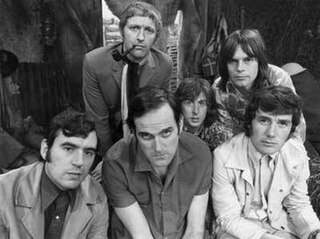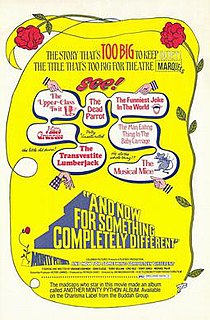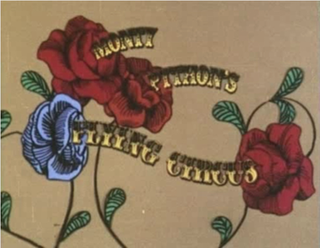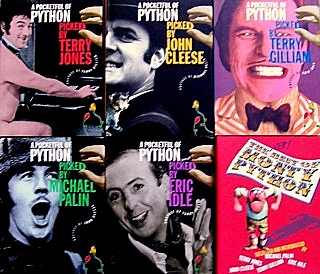Related Research Articles

Monty Python were a British surreal comedy troupe who created the sketch comedy television show Monty Python's Flying Circus, which first aired on the BBC in 1969. Forty-five episodes were made over four series. The Python phenomenon developed from the television series into something larger in scope and influence, including touring stage shows, films, albums, books and musicals. The Pythons' influence on comedy has been compared to the Beatles' influence on music. Regarded as an enduring icon of 1970s pop culture, their sketch show has been referred to as being "an important moment in the evolution of television comedy".

The "Dead Parrot Sketch", alternatively and originally known as the "Pet Shop Sketch" or "Parrot Sketch", is a sketch from Monty Python's Flying Circus about a non-existent species of parrot, called a "Norwegian Blue". A satire on poor customer service, it was written by John Cleese and Graham Chapman and initially performed in the show's first series, in the eighth episode.
"Crunchy Frog" is the common name for a Monty Python sketch officially titled "Trade Description Act", inspired by the Trade Descriptions Act 1968 in British law. It features two health inspectors interrogating the owner of a sweet shop about the increasingly bizarre ingredients in his confections, including the titular crunchy frog. Written by John Cleese and Graham Chapman, it originally appeared in episode 6 of the first series of Monty Python's Flying Circus, and later appeared in several Monty Python stage shows. In the original sketch, Cleese and Chapman play the inspectors, while the sweet shop owner is played by Terry Jones. In later versions, the second inspector is played by Terry Gilliam or left out of the sketch entirely.

Monty Python Live at the Hollywood Bowl is a 1982 British concert comedy film directed by Terry Hughes and starring the Monty Python comedy troupe as they perform many of their sketches at the Hollywood Bowl. The film also features Carol Cleveland in numerous supporting roles and Neil Innes performing songs. Also present for the shows and participating as an 'extra' was Python superfan Kim "Howard" Johnson.

And Now for Something Completely Different is a 1971 British sketch comedy film based on the television comedy series Monty Python's Flying Circus featuring sketches from the show's first two series. The title was taken from a catchphrase used in the television show.

How to Irritate People is a US television broadcast filmed in the UK at LWT on 14 November 1968 and written by John Cleese, Graham Chapman, Marty Feldman and Tim Brooke-Taylor. Cleese, Chapman, and Brooke-Taylor also feature in it, along with future Monty Python collaborators Michael Palin and Connie Booth.

"Argument Clinic" is a sketch from Monty Python's Flying Circus, written by John Cleese and Graham Chapman. The sketch was originally broadcast as part of the television series and has subsequently been performed live by the group. It relies heavily on wordplay and dialogue, and has been used as an example of how language works.

Monty Python's Personal Best is a miniseries of six one-hour specials, each showcasing the contributions of a particular Monty Python member. Produced by Python (Monty) Pictures Ltd., the series first aired on PBS stations between 22 February and 8 March 2006, although the Eric Idle and Michael Palin episodes were initially released by A&E on two Region 1 DVDs in 2005; the remaining episodes were released in late February 2006.

Parrot Sketch Not Included is a tribute special to the Monty Python comedy group, put together to celebrate the 20th anniversary of the debut of the group's television series, Monty Python's Flying Circus. Produced by Tiger Television for the BBC, it was compiled by noted British comedy producer John Lloyd and broadcast on BBC 1 on 18 November 1989.
The Fish Licence is a sketch from Series 2 Episode 10 of the popular British television series, Monty Python's Flying Circus. It first aired on 1 December 1970.
"Dirty Hungarian Phrasebook" is a Monty Python sketch. It first aired in 1970 on Monty Python's Flying Circus as part of Episode 25. Atlas Obscura has noted that it may have been inspired by English as She Is Spoke, a 19th-century Portuguese—English phrase book regarded as a classic source of unintentional humour, as the given English translations are generally completely incoherent.

Python Night was an evening of Monty Python-related programmes broadcast on BBC2 on 9 October 1999, to celebrate the 30th anniversary of the first broadcast of Monty Python's Flying Circus. It featured newly written sketches, three documentaries and a screening of Monty Python's Life of Brian.
"Anne Elk's Theory on Brontosauruses" is a sketch from Episode 31 of Monty Python's Flying Circus, "The All-England Summarize Proust Competition".

Monty Python’s Flying Circus is a British surreal sketch comedy series created by and starring the comedy group Monty Python, consisting of Graham Chapman, John Cleese, Eric Idle, Terry Jones, Michael Palin and Terry Gilliam, aka the "Pythons". The first episode was recorded at the BBC on 7 September 1969 and premiered on 5 October on BBC1, with 45 episodes airing over four series from 1969 to 1974, plus two episodes for German TV.
"The Mouse Problem" is a Monty Python sketch, first aired on 12 October 1969 as part of Sex and Violence, the second episode of the first series of Monty Python's Flying Circus.
"Albatross" is a sketch from Monty Python's Flying Circus. It is particularly known for its opening lines: "Albatross! Albatross! Albatross!"

A Pocketful of Python is a series of five books by the Monty Python team, in which each of the surviving members selects their favourite material from the group’s TV series, films, records and books. The first two volumes, by Terry Jones and John Cleese, were released in 1999 as part of the team’s 30th anniversary celebrations. Two further volumes, by Terry Gilliam and Michael Palin, followed in 2000 while the final volume, by Eric Idle, was eventually released in 2002. Each team member’s volume includes a preface written by one of the other Pythons. In 2006 all five volumes were released as a single paperback edition, entitled The Very Best of Monty Python.

The Pythons Autobiography by The Pythons is the official autobiography of the Monty Python team, released in 2003. It covers the whole of Python history, from their childhoods all the way through to the 30th anniversary celebrations in 1999.
References
- ↑ Chapman, Graham; Cleese, John; Gilliam, Terry; Idle, Eric; Jones, Terry; Palin, Michael (1989). Wilmut, Roger (ed.). The Complete Monty Python's Flying Circus: All the Words, Volume One. New York, New York: Pantheon Books. p. 320 (Appendix). ISBN 0-679-72647-0.
- 1 2 3 4 5 All the Words, Volume One, pp. 220–222.
- ↑ Wakeman, Rosemary, ed. (2003). Themes in Modern European History since 1945. Routledge. ISBN 978-0-415-21987-7.